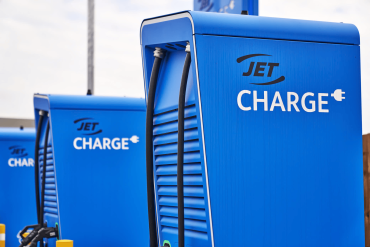

Electric vehicle charging network JET Charge secures major funding to expand Australia’s EV infrastructure amid rising adoption rates
Key Takeaways
- JET Charge secures $72 million Series C funding led by Mirova to accelerate Australia’s EV charging infrastructure rollout, marking an increase from previously reported $65.83 million.
- EV sales surge 25% year-over-year in May with JET Charge forecasting EVs will reach 50% of new vehicle sales by 2030, up from less than 10% in 2024.
- Strategic partnership with Karmo launched to offer bundled EV subscription services with charging infrastructure, targeting barriers to mass market adoption.
Introduction
Australia’s electric vehicle charging leader JET Charge has raised $72 million in Series C funding to accelerate the nation’s transition to electric mobility. The Melbourne-based company, which employs 170 people and operates across charging hardware, software, and installation services, secured the investment round led by sustainable investing firm Mirova.
The funding arrives as Australia experiences unprecedented EV growth, with sales jumping 25% year-over-year in May and the market transitioning from Tesla-dominated to mainstream adoption. JET Charge’s expansion positions the company to capitalize on projected growth that could see EVs capture 50% of new vehicle sales by 2030.
Key Developments
Founded in Victoria in 2013, JET Charge has established itself as Australia’s market leader through vertical integration spanning hardware, software, installation, and ongoing support services. The company’s full-stack approach differentiates it from competitors by offering end-to-end solutions for residential, commercial, and fleet customers.
Recent data shows Australia’s EV market gaining momentum with 115,000 electric vehicles sold in 2024, representing 9% of new vehicle sales and surpassing 100,000 annual sales for the first time. The growth trajectory aligns with multiple state government targets established this year to accelerate electric vehicle adoption.
JET Charge recently announced a national partnership with car subscription platform Karmo to streamline EV access and charging solutions. The collaboration offers subscribers exclusive pricing on home and commercial chargers, creating an integrated solution that addresses traditional barriers to electric vehicle adoption.
Market Impact
The latest funding round brings JET Charge’s total equity investment to $72 million, with participation from Clean Energy Finance Corporation, RACV, and Kilara Capital alongside lead investor Mirova. The capital injection reflects growing investor confidence in Australia’s EV infrastructure sector.
Electric vehicle adoption patterns show the market evolving beyond early adopters, with range anxiety diminishing as more vehicle models enter the market. The upcoming New Vehicle Efficiency Standard will expand low-emission vehicle options in popular segments like medium SUVs from 30 vehicles in 2024 to 40 in 2025.
Commercial fleet adoption remains slower than consumer sales, with fleets representing less than 30% of the current EV market due to concerns about residual values and servicing infrastructure. However, government emission reduction mandates drive fleet electrification among public sector and environmentally conscious businesses.
Strategic Insights
JET Charge’s vertical integration strategy provides competitive advantages over international players entering the Australian market. The company’s locally developed software supports smarter energy use, billing, and fleet management while enabling innovations like vehicle-to-grid capabilities that turn EVs into distributed energy resources.
The “JET Charge+” subscription model bundles hardware, technology, and services for large fleets and public infrastructure projects, shifting from traditional capital expenditure models to operational expense structures. This Charging as a Service approach removes upfront capital barriers while providing ongoing maintenance and support.
Infrastructure development remains uneven between urban and regional areas, creating opportunities for targeted expansion. Government initiatives address coverage gaps, particularly for high-demand holiday travel corridors, while lessons from electric bus deployments inform commercial vehicle electrification strategies.
Expert Opinions and Data
Tim Washington, CEO and co-founder of JET Charge, emphasizes the funding’s role in infrastructure scaling. “This funding will enable us to build the scalable, accessible, and reliable infrastructure required to make EVs a practical choice for every Australian and New Zealander,” Washington states.
Co-founder Ellen Liang highlights the strategic focus on service-based models. “CaaS removes the cost and complexity of operating an EV charging network, eliminating many of the upfront capital barriers by seamlessly bridging the digital and physical worlds to deliver a reliable EV charging network,” according to CleanTechnica.
Kristian Handberg, Head of Future Business at JET Charge, reports growing market acceptance with buyer misconceptions declining following recent policy developments. The Australian Energy Market Operator projects EVs could represent 72% of road transport under aggressive scenarios by 2040, requiring substantial infrastructure investment.
Nick Boucher, CEO of partner company Karmo, describes their collaboration as addressing traditional adoption barriers. “We’re making it easier than ever for Australians to switch to EVs without the financial burden and complexity that has traditionally held people back,” Boucher explains.
Conclusion
JET Charge’s funding success and strategic partnerships position the company to capitalize on Australia’s accelerating electric vehicle transition. The combination of vertical integration, local software expertise, and service-based business models addresses key market barriers around cost, complexity, and infrastructure reliability.
The company’s growth trajectory reflects broader trends toward integrated clean energy solutions that combine transportation electrification with renewable energy and grid optimization. As Australia builds domestic clean technology capabilities, JET Charge’s comprehensive approach to EV infrastructure establishes a foundation for sustained market leadership in the nation’s electric mobility transformation.







